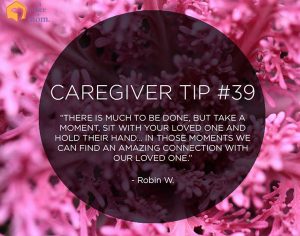Stress seems to be an unavoidable part of being a family caregiver
It’s important to find ways to take care of ourselves and manage the stress. Not to mention that when you are feeling better, you can be a better caregiver!

1. Breathe
Deep breaths increase the amount of oxygen in your blood, which helps you relax instantly. Shallow breathing makes your heart beat faster and your muscles tense – intensifying your stress. When you feel stressed, put your hand near your belly button. Inhale slowly through your nose and watch your hand move out as your belly expands. Hold the breath for a few seconds, then exhale slowly.
Repeat several times.
2. Visualize calm
This might sound hokey, but studies have found that visualization works for relieving stress. When you feel tense and frustrated, imagine yourself in a calm, relaxing situation. Think about the details – how it looks, sounds, and smells. For example, imagine that you’re in a hot soothing shower with lavender-scented soap and your stress is washing away down the drain. Or, you’re walking on a warm beach, listening to the crashing waves, smelling the salt air, and watching a beautiful sunset.
3. Make time for a mini self-massage
A full-on massage in a spa would be ideal, but when that’s not possible, self-massage is still a great way to cope with caregiver stress. Make circular motions with your thumb to massage the palm of your other hand. Or, get an inexpensive massage gadget to soothe your neck, shoulders, and body.
4. Smile – even if you don’t feel like it
Smiling works in two ways. We do it when we’re happy, but the act of smiling can also cause you to feel happier. So even if you’re feeling crappy, go ahead and paste a big smile on your face. Soon you’ll actually start to feel better!
5. Come up with a mantra
Affirmations also sound hokey, but they do work. When you tell yourself something positive, it helps you cope with whatever is happening. A helpful mantra could be something like:
- It will be okay, I can do this.
- One thing at a time.
- I am good at this. I can handle it.
- I feel calm and I can handle this.
- Slow and steady as it goes.
When you’re feeling overwhelmed, anxious, or hopeless, repeat your stress-relieving mantra 10 times.
6. Adopt a fighter’s mentality
Thinking things like “Why do I have to be the one taking care of mom?” or “What did I do to deserve this?” only adds to your stress.
When you feel like a victim, you’ll be filled with self-pity and hopelessness. If you focus on being proactive and work to improve your situation, you’ll feel more in control and less stressed.
7. Put it on paper
Writing down your thoughts helps get them out of your head and gives you better perspective on the things that are bothering you. One effective stress reduction technique that’s perfect for caregivers is journaling. Writing in a journal is free, takes as much or as little time as you’ve got, and can be done anywhere.

A helpful exercise is to divide a piece of paper into two parts. On one side, write down things you might be able to change, like finding caregiving help. On the other, write down the things you can’t change, like being the primary caregiver.
Focus on the things you can change because stressing over things you can’t change only hurts yourself.
8. Count to 10
Caregiving is frustrating and your older adult might get on your last nerve several times a day. Not only can it make you resentful or depressed, it can also cause serious health conditions like anxiety, risk of heart attack, chronic conditions that can affect your day to day life, or some other physicial or mental disability.
Before you say or do something you might regret, step away and give yourself a minute to collect yourself before you respond.
Count to 10, take 5 deep breaths, or do 3 stretches – whatever you need to calm down and think rationally again.

9. Try aromatherapy
Essential oils like lavender, peppermint, rose, and eucalyptus are soothing and relaxing. To make a simple scent diffuser, put a few pieces of rock salt in a small container and add a few drops of an essential oil. Anytime you feel stressed, open the container and breathe in the relaxing scent.
Similar to an experience in a spa, you could also get an aromatherapy oil diffuser to create a soothing scented atmosphere in the room.
Some caregivers have said that using these types of room diffusers are a great way for both them and their older adult to feel more relaxed.
10. Loosen your neck and shoulders
Most people carry stress in the muscles of their neck or shoulders. Loosening them up helps you literally shake off some of the stress.
Stand or sit, stretch your arms out from your sides and shake your hands vigorously for about 10 seconds. Slowly roll your head to the left, then across your chest to the right side. Roll your shoulder forward, then back to help loosen those muscles that can tighten in your neck and shoulders.
While you’re at it, take a few deep breaths – that doubles the stress relief.
11. Move your body 
Getting up and moving around helps you breathe more deeply and increases circulation. Take a step outdoors. Take a deep breath and close your eyes for a brief moment.
If you can, go outside for a brief walk. If you aren’t able to leave the house, walk around inside your home.
12. Rub a dub- Take a warm soak
When you get a chance to take a break, take a hot bath or shower. Soaking helps your body relax and releases tension.
If you don’t have time for a bath, wash your face, hands, or arms with warm or hot water. While you’re doing that, imagine that you’re taking a relaxing bath.
13. Immerse yourself in music 
Music is an excellent way to relieve stress and boost mood. Classical music has been shown to have many stress relieving benefits, but almost any kind of music can have a similar effect.
The next time you’re feeling overwhelmed, listen to classical music or some of your favorite tunes.
Get an extra relaxation bonus by dancing like nobody’s watching.
14. Stretch your body
Muscles naturally tighten up over the day and when we’re stressed, they get even more tense.
Take some time to relax and release that stress with some quick stretches or gentle yoga accompanied by slow, deep breathing.
Keeping a positive mental attitude is a priority. Maintain the support of family and friends for emotional support. No one can do it alone.
15. Consider Respite for a loved one
One of the many services that a life plan community, like McGregor, offers is respite stays. Short-term respite care is becoming more and more of a necessity. It provides a comfortable, secure home-away-from-home for a parent or family member when you are out of town or temporarily unavailable to give care. A respite stay is often the perfect transition between a hospital stay and home.
Respite guests choose which types of activities they wish to participate in, determine how much or how little they wish to socialize with other guests, and enjoy the selective dining menu available at our facility. In addition, we ensure all medications are taken on time and that any necessary medical treatments are provided. We encourage caregivers to enjoy peace of mind knowing that loved ones will have the opportunity to participate in life enrichment activities, programs and outings to maximize their enjoyment nurturing mind, body and spirit. Holidays and travel make McGregor’s Vacation Suites the perfect accommodations for families!

